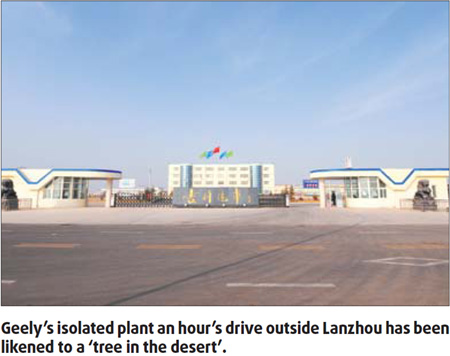Geely first entrant in race to 'go west'

With China now the world's largest auto market, carmakers are eagerly expanding production while eyeing untapped inland markets. Domestic automaker Geely made its bold move earlier than the rest.
The Zhejiang-based private carmaker set up an auto plant in the capital of Gansu province in 2006, which four years later remains the only plant making sedans in all of underdeveloped northwest China.
The factory is about an hour's drive from downtown, standing out on a vast expanse of moorland with no other buildings nearby. Some say it's a tree in the desert.
With the support from local authorities, Geely is about to plant more "trees" to create an "oasis".
Earlier this month the automaker and the local government signed an agreement to bring in 20 to 30 parts suppliers and build the site into an automobile industrial zone, or in their words, "a modern motor city on the loess plateau".
An Conghui, Geely's vice-president, said in an interview before the signing ceremony that 12 of its existing parts partners will open shop in Lanzhou to take advantage of Gansu's raw materials and also help develop local suppliers.
Geely also plans to invest 2 billion yuan and increase production capacity of its Lanzhou plant to 120,000 units per year that will include 100,000 Free Fleet and Gleagle subcompacts as well as 20,000 mid-class Emgrand models.
Nearly 20,000 cars rolled off the production line at the plant last year. An said the capacity will increase to 40,000 units this year and 80,000 to 100,000 units in 2011.
Geely's chairman Li Shufu admitted the facility has not yet made a profit mainly due to high logistics costs and small production volume. He is confident that bringing in auto parts suppliers and expanding production capacity will greatly reduce costs and make the factory profitable.
Li also noted the initial motive to build the Lanzhou plant was in response to the government's call for developing western regions.
"Business opportunities usually lie in national strategies," he said.
The Lanzhou plant is far from the largest of Geely's nine facilities across China, but its positioning is important. The location in a transportation hub city will play a crucial role in exporting Geely's cars to Central Asia and Eastern Europe.
The company's other major export base is the coastal city Ningbo in its home province Zhejiang where most of its shipments to southern countries and regions originate.
Despite tumbling exports in the wake of the global recession last year, Geely is building more overseas plants that will be unveiled soon, according to An. The company now runs production lines in Russia, Ukraine and Indonesia. A Malaysian plant is set to begin operations soon.
An said that the company will reach its goal to produce and sell 2 million cars by 2015 ahead of the schedule. Yet given the stagnant overseas demand, Geely's blueprint was adjusted to reduce the proportion of exports to one-half of the total sales, down from the original two-thirds.
Rapid development
Geely is riding high these days with sales surging by 48 percent to 330,000 units last year. It purchased the Australian automatic transmission supplier Drivetrain Systems International (DSI) last March. It received wide media exposure in its bid to acquire Volvo, a deal expected to finalize this year.
Compliments as well as questions surround to Li Shufu, but he remains cool-headed.
"The auto industry is like a marathon race - the key is not to run too fast at the beginning," he said, underscoring Geely's emphasis on technological innovation and training of professionals.
Earlier this month, Geely won the second prize in the 2009 State Science and Technology Award for its innovation, with no first prize awarded. For the past two years, only 12 out of more than 5 million candidate companies received the prize.
The State-level award is not about a single patent or design, but the entire system that cultivates more talent and new technologies, said Zhao Fuquan, Geely's vice-president in charge of research and development.
According to Zhao, the award marks a great leap in Geely's capacity for innovation after the company strategically switched from merely competing with pricing to making quality cars.
The company now has several self-developed engines and transmissions. It is also working on a second generation of its own tire blowout monitoring and braking system, a major breakthrough in safety control technology.
 0
0 






